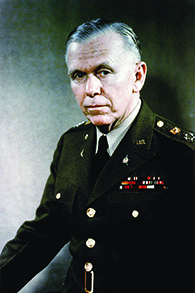| << Chapter < Page | Chapter >> Page > |
Truman’s motivation was economic and political, as well as humanitarian. The plan stipulated that the European nations had to work together in order to receive aid, thus enforcing unity through enticement, while seeking to undercut the political popularity of French and Italian Communists and dissuading moderates from forming coalition governments with them. Likewise, much of the money had to be spent on American goods, boosting the postwar economy of the United States as well as the American cultural presence in Europe. Stalin regarded the program as a form of bribery. The Soviet Union refused to accept aid from the Marshall Plan, even though it could have done so, and forbade the Communist states of Eastern Europe to accept U.S. funds as well. Those states that did accept aid began to experience an economic recovery.
The youngest child of a Pennsylvania businessman and Democrat, George C. Marshall ( [link] ) chose a military career. He attended the Virginia Military Institute, was a veteran of World War I, and spent the rest of his life either in the military or otherwise in the service of his country, including as President Truman’s Secretary of State. He was awarded the Nobel Peace Prize in 1953, the only soldier to ever receive that honor. Below is an excerpt of his remarks as he accepted the award.

There has been considerable comment over the awarding of the Nobel Peace Prize to a soldier. I am afraid this does not seem as remarkable to me as it quite evidently appears to others. I know a great deal of the horrors and tragedies of war. Today, as chairman of the American Battle Monuments Commission, it is my duty to supervise the construction and maintenance of military cemeteries in many countries overseas, particularly in Western Europe. The cost of war in human lives is constantly spread before me, written neatly in many ledgers whose columns are gravestones. I am deeply moved to find some means or method of avoiding another calamity of war. Almost daily I hear from the wives, or mothers, or families of the fallen. The tragedy of the aftermath is almost constantly before me.
I share with you an active concern for some practical method for avoiding war. . . . A very strong military posture is vitally necessary today. How long it must continue I am not prepared to estimate, but I am sure that it is too narrow a basis on which to build a dependable, long-enduring peace. The guarantee for a long continued peace will depend on other factors in addition to a moderated military strength, and no less important. Perhaps the most important single factor will be a spiritual regeneration to develop goodwill, faith, and understanding among nations. Economic factors will undoubtedly play an important part. Agreements to secure a balance of power, however disagreeable they may seem, must likewise be considered. And with all these there must be wisdom and the will to act on that wisdom.
What steps did Marshall recommend be taken to maintain a lasting peace? To what extent have today’s nations heeded his advice?

Notification Switch
Would you like to follow the 'U.s. history' conversation and receive update notifications?